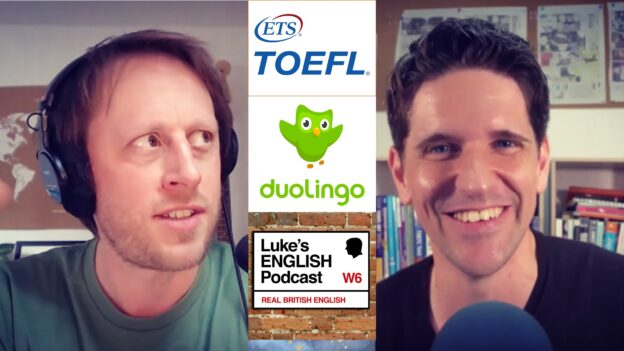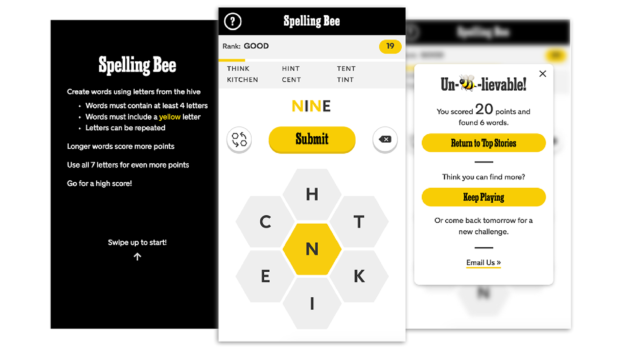Learn English with another short story. In fact, this episode contains two stories. Listen until the end for the 2nd one. Repeat after me to practise your pronunciation. Learn some vocabulary & grammar in the second half of the episode, with an explanation of modal verbs of deduction in the past and present. Video version available.
Video Version (with on-screen text)
Sign up to LEP Premium for a premium series with another story (P41)
Download the episode transcript here
Episode Transcript
Hello everyone,
Welcome back to the podcast. How are you doing out there in podcast land? Surviving?
Here’s a new episode. It’s time to do some more English learning with a story.
In this episode, I’m going to read another short story to you, and use it to teach you some English.
I recommend that as well as listening to me read the story out loud to you today, that you read this story out loud too, and I will give you a chance to do that by repeating after me.
We’ll also look at some vocabulary and grammar from the story during the episode. And if you listen until the end, I will tell you another story too.
That’s all going to come later in the episode. If you’re watching the video version – hello. Don’t forget to like & subscribe.
If you are listening to the audio version. Click the link in the description to visit the page for this episode where you will be able to read a transcript for the whole things. You’re welcome.
100-Word Stories
Recently I have been looking for short stories to help me teach English, the shorter the better, and I found lots of 100-word stories on several websites. A 100-word story is a story with no more than 100 words.
There are a couple of sites where you can find a lot of these. One site is called https://100wordstory.org/ and the other is https://www.fridayflashfiction.com/
Anyone can submit a story to these sites. The stories are then checked by the website editors and then published for everyone to read.
The only rule for the writers, is that the stories have a 100-word limit. I think the minimum is 75 words, but the maximum is 100. So, a story with no more than 100 words.
That’s quite a challenge.
The writers need to be very disciplined. They have to choose their words carefully, and as a result these stories are very minimal and manage to convey descriptions and emotions using only a few words.
As a teacher of English, I think these stories are great because it gives us compelling and concise samples of English to work with.
Get the book
I want to just point out that there is a book full of these very short stories, which you could buy.
It’s called Nothing Short of 100: Selected tales from 100 Word Story
It is a collection of stories from the https://100wordstory.org/ website.
There’s a Kindle version or a print version.
It is published by OUTPOST 19 and it was put together by the team behind the website, including Grant Faulkner, Lynn Mundell and Joshua Michael Stewart.
It is available for you to purchase and I recommend it if you are looking for bite size stories to use for learning or teaching English.
I also recommend visiting https://100wordstory.org/ and www.fridayflashfiction.com where you can find absolutely loads of stories like this with new ones arriving each week.
Today’s story
OK so let’s start with a story which I’ve selected from the Nothing Short of 100 book.
This story is called DOPPELGÄNGER
By the way, we don’t usually use an umlaut in English → ä
What is a doppleganger?
A doppelganger is someone who looks exactly like someone else, but it’s creepy and scary, like a ghostly copy of someone.
I think the word has its origins in German (hence the umlaut in the title), and translates directly as “double goer”. So your doppelganger is your double, a copy of you, who looks exactly like you and who goes around, walking the earth.
In my case, that would be Luka Modric, the Croatian footballer. That’s what people say anyway, that Luka Modric is my doppelganger.
Yes, he is my doppelganger. I’m not his doppelganger, ok? He’s my doppelganger. I was here first!
We do use the word in conversational English.
We say things like “Oh, I saw your doppelganger in the street today!” (meaning, “I saw someone who looked just like you”)
or “It’s amazing, he’s your complete doppelganger!” etc.
I don’t know if you’ve ever experienced that. Has it ever happened to you? Have you ever seen someone who looks exactly like someone you know? Have you ever done a double take and been confused for a split second? Has anyone told you that they’d seen your doppelganger?
OK, I’m now going to read the story
Just one question 👇
- How did the person feel at the end of the story? Why?
Answer: She felt shocked, upset, sad, surprised and possibly heartbroken. Maybe she couldn’t believe her eyes, because she saw her lover with another woman, or she saw someone who looked exactly like her lover with another woman.
Listen to the episode to hear me summarise and explain the story.
Let me give my comments and explanations, line by line (listen to get my comments)
| DOPPELGÄNGER I almost didn’t see the you who wasn’t you. I was walking past the outdoor tables of the French café, and just at the last second, I caught a familiar hand gesture, and looked again. It couldn’t have been you though, my love, because your other hand was clasping the hand of the woman opposite. Your heads were too close. She was laughing, that abandoned laughing you do when you’re totally in the moment, totally in love. I walked on, heels tapping out a staccato rhythm, as I no longer wanted to look at the you who wasn’t you. |
Possible interpretations
- It was her husband/boyfriend, cheating on her, having an affair with another woman.
- It wasn’t her husband/boyfriend. It was just someone who looked like him, but it still disturbed her because she’s terrified that he could cheat on her.
- It was her ex, someone she is still in love with. They’re not together any more. He’s moved on, but she hasn’t.
- It was a guy who she loves but they’re not together and she can’t bear the fact that he’s with someone else.
- Perhaps she lost her husband (he died) and she just saw someone who reminded her of him.
- Something else?
Language Analysis
Vocabulary & Grammar
- The you who wasn’t you
(Although you normally takes are/were, it is not plural, and so the relative pronoun who is singular) - Just at the last second
- on time
- in time
- Familiar
- A gesture
- To catch (a look at) something (to get a glimpse of something)
- …though
- Clasping her hand
- Abandoned laughing
- To be totally in the moment
- To walk on
- Heels
- Tapping
- A staccato rhythm
- It couldn’t have been you, my love 👇
Modal Verbs of Deduction
Present
Who is that?
| I’m sure/certain it’s Dave | It must be Dave |
| It’s possible (that) it’s Dave-not sure | It could be DaveIt might be DaveIt may be Dave |
| It’s impossible (that) it’s Dave | It can’t be DaveIt couldn’t be Dave |
Past
Who was that?
| I’m sure/certain it was Dave | It must have been Dave |
| It’s possible (that) it was Dave-not sure | It could have been DaveIt might have been DaveIt may have been Dave |
| It’s impossible (that) it was Dave | It can’t have been DaveIt couldn’t have been Dave |
Pronunciation
- Repeat the story after me, line by line.
- Try to say each line with no pauses between words.
- Notice which word has the main emphasis (stress) in each line.
- Don’t sound like a robot! 🤖
DOPPELGÄNGER
I almost didn’t see the you who wasn’t you.
I was walking past the outdoor tables of the French café,
and just at the last second,
I caught a familiar hand gesture,
and looked again.
It couldn’t have been you though, my love,
because your other hand
was clasping the hand of the woman opposite.
Your heads were too close.
She was laughing,
that abandoned laughing you do when you’re totally in the moment,
totally in love.
I walked on,
heels
tapping out a staccato rhythm,
as I no longer wanted to look
at the you
who wasn’t you.
Do you want more of this kind of thing?
Sign up to LEP Premium www.teacherluke.co.uk/premium
I do language analysis, vocab & grammar explanations and pronunciation practice.
There are stories and language reviews for conversations which have appeared in episodes of LEP.
If you sign up you can add all the premium episodes to your podcast app of choice, and also get links for video versions and PDF worksheets.
🔗 Link in the description 🔗
How about another story?
We’re not finished yet.
I’m going to read you another story. This one is also about a doppelganger.
I’ll just read the story to you, and then I’m going to do language work in a premium episode which is coming soon to the premium subscription.
OK, I am trying to persuade you to sign up to my premium subscription, but I think it’s worth it, and if you do you’ll be supporting the podcast. No pressure though.
If you don’t want to sign up or you can’t, no worries.
I’m still going to read the story to you in this free episode, now.
I hope you enjoy it.
I’ll quickly summarise it at the end (in case you don’t understand), but I’ll do the detailed language teaching in premium series, coming soon.
Story 2
| Doppelganger, by Sue Clayton From → www.FridayFlashFiction.com and adapted slightly by me. “This book says everyone has a doppelganger, a mirror image, and if you meet yours face to face, you’ll die.” Janice, my flatmate, closed the book, finished her tea and toast, and slammed out of the door for her A&E shift at St. Margaret’s hospital just down the road. She loved any kind of fantasy literature, always immersed in some supernatural genre book. Not my cup of tea at all. Give me a good Nordic Noir mystery anytime. After taking a shower I went to brush my teeth. If you meet your doppelganger face to face you’ll die, my reflection in the bathroom mirror laughed as I recited the words, but they’d begun to worm their subliminal way into my subconscious, waiting to claw their way to the surface and pounce. One day, a couple of weeks later, I headed for the front door ready to set off into town where I worked at a music store. Doppelganger, I froze as my mind hissed the insidious word. What if I saw me on the train? Or stood behind me in the line at the coffee place? What if I came into the shop to buy a record and had to serve myself? The words shot through my mind. I let go of the door handle as if I had been electrocuted, and phoned in sick. “Do you fancy a night out at that new wine bar down the street?” Janice bounced through the front door one afternoon, chirpy as a blue bird, her shift trauma-free for once. “Not tonight, Janice, I’m still not feeling very good.” The image of my other self perched on a stool at the far end of the bar, possibly raising a toast, was too hard to stomach. ‘You haven’t been outside for ages, Natalie, not even for work…you’ll end up getting fired. What’s going on with you?” Janice pressed. “I’ll meet my doppelganger and die if I go outside,” I burst into tears, knowing how ridiculous I sounded. “You know there’s no such thing. You need to get help, Natalie. I’ve got a therapist friend who works at the hospital. I’ll fix you up an appointment.” She wrapped me in a comfort hug. “You’re booked in for ten o’clock this morning.” Two days later Janice grabbed my arm and pulled me through the front door; I didn’t stand a chance. “You won’t meet yourself between here and St. Margaret’s.” She smiled reassuringly and we set off down the street. “Excuse me,” a hand tapped my shoulder as we waited to cross the busy main road. I turned around and my shriek froze the blood of everyone close by, before I stepped backwards off the footpath into the path of an articulated lorry. “I didn’t mean to frighten her,” tears ran down the anguished face of one of the two men who’d been standing behind me. He was holding a large six-feet square mirror which they were carrying across to the framing workshop across the road. “I just wanted to ask her to step to one side.” |
Summary of Story 2
The narrator, let’s call her Sue (although I realised after recording this that she’s actually called Nathalie in the story!) lives with her flatmate Janice.
One day Janice reads a line from a scary book she’s reading. It says that if you ever meet your doppelganger, you’ll die.
Sue doesn’t usually believe that kind of thing, but the idea gets into her head and as she is leaving the house one day, she suddenly gets scared that she might meet her doppelganger, and die.
So she decides to stay at home.
In fact she keeps staying at home, every day. The idea of meeting her doppelganger has made her too terrified to leave the house.
Janice gets worried about Sue and arranges for her to meet a therapist, and assures Sue that nothing can happen to her on the way.
Sue agrees to leave the house, but at the main road someone taps her on the shoulder.
Sue turns around and sees her own reflection.
The man who tapped her on the shoulder was trying to carry a mirror across the road.
He wanted to ask her to step to one side, to make space.
But Sue turned around and saw her doppelganger – her reflection in the mirror and screamed!
Then she stepped back, into the road, and was hit by a large lorry.









